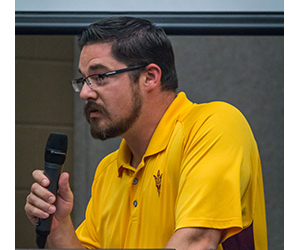
The Maricopa Unified School District governing board took the conservative route Wednesday voting to place a 5 percent, seven-year budget override measure on the November ballot.
The vote was 4-1, with board member Patti Coutre voting against the motion.
The board began considering holding a special budget override election in April, after the Legislature voted to significantly cut next year’s public-charter school funding and then stop funding it all together.
The district will now receive $2.3 million from the state to operate its charters – less than the $3.7 million it had expected prior to the budget cut. Beginning with the 2015-16 school year, MUSD will receive none of the $3.7 million.
The board considered four override options developed by an override committee: A 5 percent override would result in additional annual revenue of $1.525 million, a 7 percent override would generate $2.135 million, a 9 percent override $2.74 million and a 15 percent override $4.575 million.
According to a district tax table, a 5 percent override would increase the property tax rate on a home with an assessed value of $100,000 by $65 a year.
The district hired a company to conduct an attitude and opinion survey that asked 300 registered voters if they would approve a new budget override.
During the discussion, Superintendent Steve Chestnut said 57 percent of those polled said they would vote “yes” to a 15 percent override compared to 34 percent who said they would vote “no.” The survey found that 63 percent would vote “yes” to a 10 percent override.
The approved option would pay for up to 22 additional teachers, three additional support staff and instructional technology. The tentative instructional staff additions include gifted, art, technology and honors.
Board President Torri Anderson led the discussion saying she favored the more conservative option of a 5 percent or 7 percent override measure.
Anderson said these options would keep the tax increase under $100.
“Knowing the city increased its tax for the park and Central Arizona College increased its education tax, I would rather have a win with the conservative amount than lose with the higher amount,” Anderson said.
These override options would “still reduce class size, which is what this is all about,” she added.
Chestnut said the city’s property tax increase is set to expire on June 30, 2015 and collection of the override would begin on July 1, 2015.
Board member AnnaMarie Knorr said she agreed with the more conservative option.
“It is easier to go to the community and ask for less money,” Knorr said.
She said talking to legislators in the recent budget debate over charter school funding, she learned their main argument against funding was that districts can raise additional money by passing overrides.
“I think the Legislature has basically forced us into an override situation,” she said, adding she does not think this situation will change in the foreseeable future.
Chestnut said a 5 percent override would reduce class size in the kindergarten through sixth grades to 25. A 7 percent override would reduce class size to 24.
“Class size is an issue that resonates with voters,” he said, noting it is one of the reasons parents choose a particular school for their children to attend.
Knorr said reducing class size would place MUSD on a “much more level playing field” with schools the district competes with for enrollment.
Coutre said the Maricopa community “likes to see fast results,” arguing a 9 percent override measure could accomplish more in a shorter amount of time.
“I do think (the community) would pass a 9 percent override and get us where we want to be” in a shorter amount of time, she said.
***ADVERTISEMENT***Board member Leslie Carlyle-Burnett said she favored placing a 7 percent or 9 percent override measure on the ballot.
Carlyle-Burnett said by keeping the override “low people won’t feel they are being robbed and completely dry of everything they have with all these tax increases.”
Chestnut said he recommended the 5 percent override option to improve the district’s chances of getting a measure approved, when asked by board members for his opinion.
Anderson asked the superintendent if a 5 percent override would allow the district to continue to move forward with its academic goals and strategic plans.
He said it would be “an improvement over what the district has this year, which is an improvement over last year.”
Board member Scott Bartle said given the survey results, “it would be irresponsible of us not to let the voters have the opportunity to make this decision.”
Bartle said he favored the more conservative override option and made a motion to place a 5 percent, seven-year override on the November ballot.
“State funding for education has been a constant struggle for districts across Arizona and Maricopa Unified is no exception,” Jeff Kramarczyk, president of the Maricopa Education Foundation, said after the meeting.
“It is important that we as Maricopans keep education a priority in our lives, regardless of whether you have school age children or not. A stellar educational system is a cornerstone to a stellar community and a ‘yes’ vote on this override is a statement of your commitment to Maricopa.,” Kramarczyk said.
The Maricopa Education Foundation formed an ad hoc committee to campaign for passage of the override.
Josh Judd, an active parent and member of the MEF committee, said, “In the face of diminishing education spending by the state government, voting for the override gives Maricopa a chance to have local impact on things like class sizes and meaningful educational programs.”

![Who’s the Best Mom InMaricopa? Nominate now! Marlene Marshall, Christina Olivares, and Meghan Bremer. [Bryan Mordt]](https://www.inmaricopa.com/wp-content/uploads/2023/05/BCM_8465-218x150.jpg)



![Maricopa sheds tears amid Maui wildfires that killed dozens For Maricopa resident Janelle Gomez, the sorrow mirrors the loss of a family member. [Brian Petersheim]](https://www.inmaricopa.com/wp-content/uploads/2023/08/Gomez-218x150.jpg)
![Embracing Freedom: Celebrating the Fourth of July Councilmember Vincent Manfredi at Great American 4th 2021 [Victor Moreno]](https://www.inmaricopa.com/wp-content/uploads/2023/07/2021-Great-American-4th-e1688414543522-218x150.jpg)










